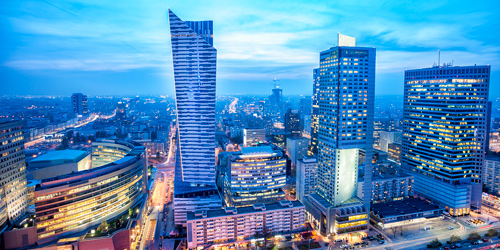Smart City management solutions

Smart City management solutions
The challenges of today's cities are the increasing number of people migrating to cities, the requirements for improving the quality of life of the society, managing the growing urban traffic, guaranteeing a high level of security, the integration and access to existing public information systems. For the city, being smart means improving the quality of life in all the seemingly independent areas mentioned above from year to year.
A Digital Platform for Urban Infrastructure Management - Metropolis:
The Metropolis Digital Platform for Urban Infrastructure Management allows for planning, implementation, monitoring and billing of smart services in the city.
Support for managers of modern cities is provided by the ISO 37120 standard, which introduces standardization of concepts within the debate on the definition of "Smart City". This standard defines 17 quality of life areas in cities and agglomerations based on 100 unambiguously defined coefficients.
The Metropolis platform is compliant with the ISO 37120 standard, it supports efficient and modern city management, in line with the idea of sustainable urban development. It integrates urban services and technologies into a single central system, while improving the coordination of urban services and enabling the active participation of the public in the provision and reception of information.
The Metropolis system allows to:
| Benefits of Metropolis for the city and its residents:
|
Integrate complex city management processes through a modern, modular management panel combining existing domain systems with modern sensors built on the basis of IoT class devices. Implement tools supporting urban safety, public transport, lighting, parking lots, modern mobility services, ecology and environment, including air and water quality control in a coordinated manner modern. Collect and analyze large data sets provided by any urban domain systems and modern urban sensorics (Big Data). Provide information to residents and third parties, enabling them to offer further innovative services for residents (Open City Data, Open API). | Optimization of city management costs through automation of activities (e.g. energy consumption, maintenance of multiple, separate systems, etc.). Easier cooperation and coordination of investments between city units thanks to a single central system, enabling a strategic global approach to all activities for the development of the agglomeration. Growth of attractiveness for investors of the well-managed city. Safer streets and neighborhoods through active monitoring and improved observance of the rules. Involvement and useful knowledge for optimizing urban activities. Improvement in the quality of life of inhabitants within the scope of safety, ecology, public transport and many other aspects of the city life. |
Basic solutions of the Metropolis platform
Comprehensive solutions supporting ITSM (transport infrastructure management), SDIP (Dynamic Passenger Information), AFC (automatic toll collection integrated with the Urban Card system), built with the use of modern vehicle infrastructure and an integrated central system supporting EMV micropayments in MTT (Mass Transit Transaction) and KnownFare models, enabling modern implementation of urban mobility services (combined tickets, multi-modal travel with uniform settlement, etc.).
The solution offers a central application for the city, allowing for monitoring the availability of parking spaces, events in bus bays and at bus stops, and a mobile application for residents to navigate free parking spaces and handle citizens’ reports. It makes it possible to keep advanced statistics related to the different aspects of movement of objects in the urban space (buses, cars, single-track vehicles and pedestrians).
LED street and park lighting management system using both wireless transmission (GSM/LTE/Lora/ZIGBEE etc.) and PLC technology. The system enables managing individual luminaries, creating luminary groups and scenarios dedicated for them, using both motion sensors and autonomous operation.
The solution includes environmental monitoring, providing measurements of the following parameters: PM2.5, PM10, NO2, SO2 O3, noise, temperature, pressure, insolation, wind, humidity, precipitation, etc. The central application collects data from measurement stations and creates dedicated maps and reports from statistics, which are available in the mobile application for residents.
The solution provides a central application for the city managing beacons, content in the mobile application, presenting statistics and gamification scenarios, as well as a mobile application for residents or tourists, which cooperates with beacons located in the city or a cultural event zone.



